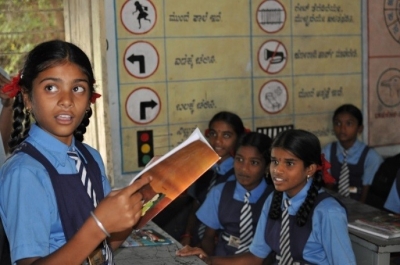( Usha Thothathri, ILP Vounteer)
If you chronicle a successful family unit of any ethnicity or geography, you will often find that a woman has played a pivotal role. Sometimes the role is overt and obvious for all to see and appreciate. But often times, the contribution is behind the scenes, forming the bedrock upon which the family thrives. Poor families in the villages of India are no different – the mother nurtures the young, manages the home and also works in the fields or factories to earn a livelihood. Days are long and hard. Training starts early for the girl-child, being entrusted with the care of younger siblings and managing household chores. To make matters worse, most Indian girls also deal with a strong cultural bias against education and self-independence, leading to child-marriage and other social issues. The result, many a girl-child is deprived of the opportunity to go to school and aspire for a life different from that of her own mother or grandmother. The cycle repeats itself generation after generation.
A key mission for the India Literacy Project (ILP) is to identify women and girls at risk of being denied equal opportunity as their male counterparts, and to provide fair access to education and constantly find creative ways to keep them engaged in their growth as productive individuals and equal citizens. For instance, educating women and mothers through ILP’s adult literacy programs allows them to get a head-start in understanding their own rights and sets them on a path to treat their girl and boy-children alike. ILP spearheads programs to educate young mothers on prenatal care for themselves, proper care for their newborns, the value of good nutrition and early childhood development. This approach teaches them to stay engaged from the onset and actively participate in monitoring the quality of preschools (anganwadis) all the way to the primary and secondary schools. Empowered mothers make outspoken activists for their children and families.
As a key goal, ILP focuses on school-age girls to make sure that they do not get left behind, but instead go to school  and stay engaged in academics. One of the reasons for high dropout rates for girls is the lack of girls-only toilets (that most of us take for granted). ILP partnered with the government to set up girls-only bathroom facilities in many schools, and gradually saw rising enrollment and retention rates for girls. As girls progress through the government high schools, they are able to leverage several ILP-funded programs such as the Multi-dimensional Learning Spaces through science kits that encourage a natural curiosity for science, computer labs to teach skills necessary for the modern workplace and libraries that cater to different reading levels. ILP is also investing in Career Guidance and Counseling sessions to give girls a chance to review various career options available to them based on their academic interests and make well-considered decisions.
and stay engaged in academics. One of the reasons for high dropout rates for girls is the lack of girls-only toilets (that most of us take for granted). ILP partnered with the government to set up girls-only bathroom facilities in many schools, and gradually saw rising enrollment and retention rates for girls. As girls progress through the government high schools, they are able to leverage several ILP-funded programs such as the Multi-dimensional Learning Spaces through science kits that encourage a natural curiosity for science, computer labs to teach skills necessary for the modern workplace and libraries that cater to different reading levels. ILP is also investing in Career Guidance and Counseling sessions to give girls a chance to review various career options available to them based on their academic interests and make well-considered decisions.
ILP passionately believes that the future of any society relies heavily on the health and education of its girls who will not only power its economy but also be the foundation upon which a successful family will thrive.
Donate or volunteer at INDIA LITERACY PROJECT | A catalyst for 100% literacy in India and help us educate a girl today.